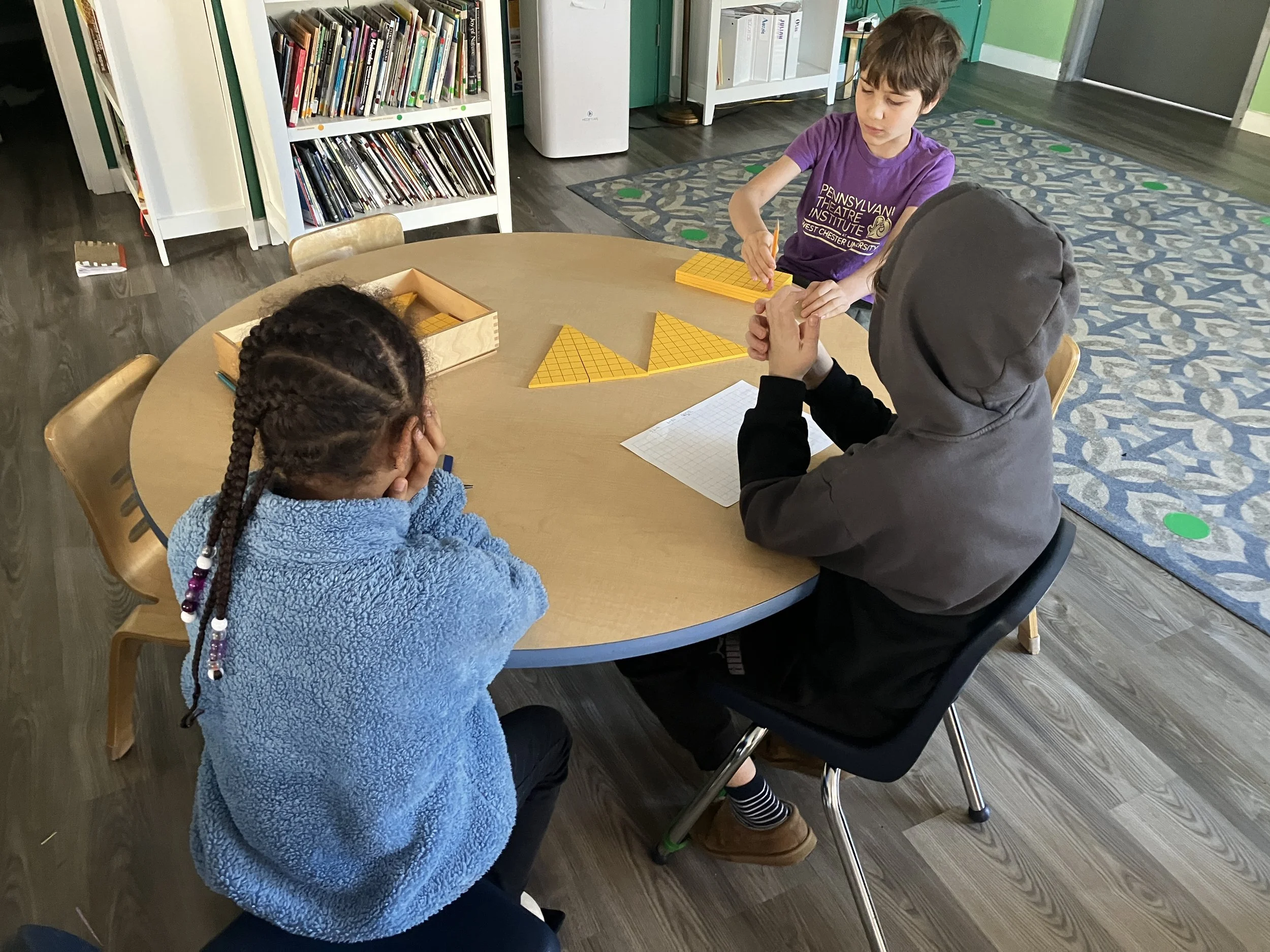Montessori Elementary
The Montessori approach is structured, child-centered, and developmental. It honors each child as an individual within our broader community. The six-year program provides rich interdisciplinary learning, as well as supported freedom of choice. Children with particular passions deepen their understanding, seek out resources, and take on large projects. We often describe Montessori elementary as “cosmic education”: a wonder-based approach to the universe, our place within it, and our contributions to its vast diversity.
During the course of a typical day, children have two uninterrupted work periods. During these times, they receive short, hands-on lessons, practice their learning, and pursue purposeful projects. Guides present lessons in math, language, geometry, biology, geography, physical sciences, history, music, art, and handwork. They work with children to support their choice of meaningful activity. They observe children, help children record what they have done, and meet with them on a regular basis to review progress and set goals. Children experience freedom, bounded by responsibility to the community and to the state standards.
FAQs
-
8:30 Arrival and Morning Work Cycle
Children receive lessons in small groups and work to practice what they have learned recently. They are free to choose where and how they work.
11:00 Community Meeting
The class meets as a whole for announcements, student presentations and work sharing, and collaborative problem-solving.
11:30 Lunch
12:00 Recess
12:45 Afternoon Work Cycle
As in morning work cycle, children receive lessons and practice their learning. Adults also meet one-on-one with children to review work records and make plans.
3:00 Dismissal
-
We find that children usually do not need to be presented with a subject over and over again, as they are in traditional school models. Instead, we present new learning in short, hands-on lessons, and children practice independently or in small groups, with regular check-ins with adults. We are therefore able to use the school day extremely efficiently, in a way that’s tailored exactly to what each child is ready to learn next.
-
We go outdoors to a nearby city park almost every day, in almost any weather. We also often explore subjects like botany and zoology with specimens observed outside. We think it’s vital for children to spend time outside, and we look for as many chances as we can to make that happen.
-
Art, music, dance, drama, and physical movement are integrated into the day. We believe it’s important to understand these practices as human expression that can be created and enjoyed by anyone, and that don’t need to be done by special experts or constrained to one bounded part of the week. Children use all these forms of expression (and more!) to follow up on and practice their learning.
-
Because we collaborate with children to help them design their own learning, we are able to support almost any kind of child-led focused study. We have helped children pursue deep interests in foreign languages, coding, chemistry, piano, and more.
-
Because Montessori elementary helps children develop both self-reliance and cooperative skills, children are well prepared for whatever school they enter next. Children have graduated successfully to public, private, and charter schools. In a child’s last year at Hyacinth, we work with families as needed/requested to explore schools that may be a good fit for each individual child.
-
In the Montessori elementary classroom, we encourage children to look beyond the boundaries of the school. Children lead “going outs,” which are focused excursions that arise naturally from the children’s interests and work. These might look like going to a store to get the materials for a project, going to the zoo to present animal research, or going to a museum to look at the work of a particular artist.
-
This one is asked by almost every visitor (sometimes substituting in a different non-preferred subject). The answer is that while we provide freedom, we provide freedom within responsibility to the state standards and to the lessons children have received. If a child is avoiding a particular subject, we look closely at what might be causing the barrier and collaborate to help that child meet expectations. It’s not an option never to choose math, but we can work together to figure out what makes math feel uncomfortable or frightening and remove that obstacle.
-
Hyacinth Montessori has chosen to be affiliated with the Wildflower Foundation. Wildflower is a nonprofit that supports teachers in starting equitable micro-schools. Wildflower schools are all unique and independent, but share a set of principles:
authentic Montessori
teacher-led schools
small, shopfront settings
being laboratories for innovation
seamlessly integrating school with the community
a commitment to equity
attention to beauty
a focus on nature
a mutually supportive, decentralized network of like-minded school leaders

